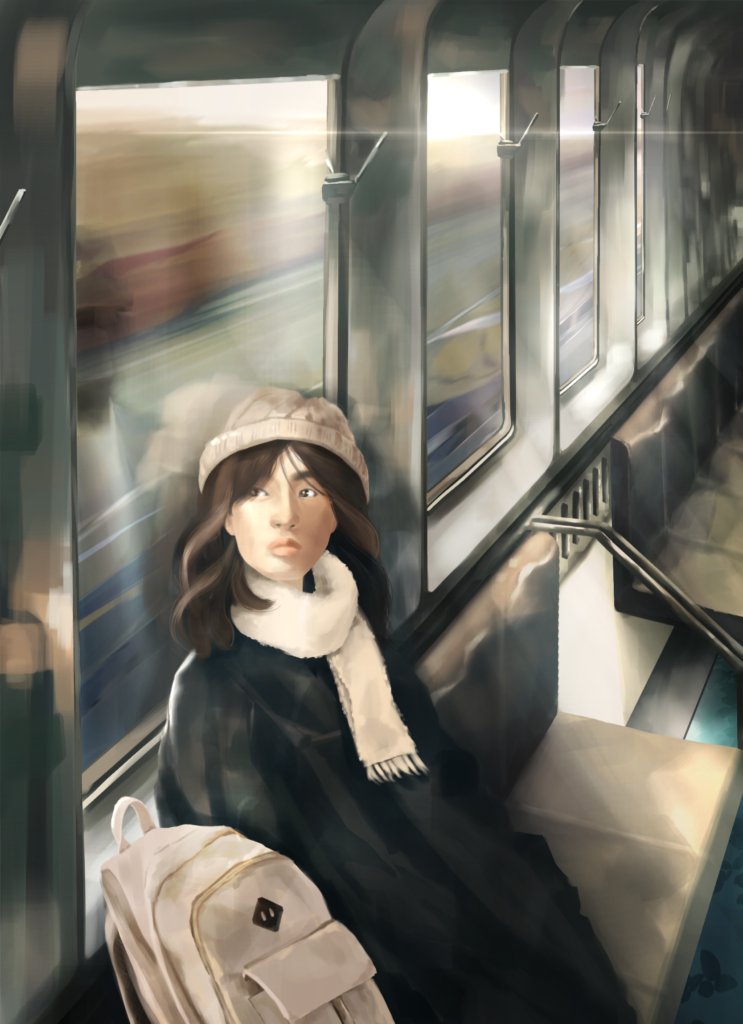Trains and Windows
Sophia Zhang | Art by Mia Liu
The man scrolled through the familiar, disinfected corridor – after so many years, it still smelled of death. He looked down as he walked into a tiny room, card in hand, laying it down on the table beside an unconscious girl. He disappeared.
***
Faint whispering was coming from the hallway. She couldn’t distinguish between the doctor’s jumbled words, but she knew – she was dying. It was a simple deduction: death was ambling closer to her, placing a gold-embalmed card on the table. Her lungs felt like two plastic bags trapped in small fists – death would come as a relief, a path to be free from this pain, even though she had wanted to experience more – the satisfaction of seeing a brilliant smile on a patient, the breeze atop the gentle cliffs as the sun finally left, perhaps.
A blurry outline of a doctor walked near. She could hear herself. “How much longer?” He paused. “Do you want to know?”
Did she want a cap put over her time? A definitive marker of how long she would be who she was, before fading completely? “No, not really.”
The doctor smiled and left. Once again, she was all alone in this tiny space.
She was young. Young enough to have the innocence that everything would be okay, old enough to know that it wouldn’t. Her mother’s words floated to mind – “If you could relive your life again, what would you do?” She couldn’t know.
So, with nothing to do and unwilling to answer that question, she opened the golden card no one had noticed. Carpé Diem – a once-in-a-lifetime train ride for you to experience. Sign if you would like to participate.
Her mind said no – she wanted to die in peace – and it was too risky, too full of holes. But something inside her was whispering, whispering for more than just mere existence, floating along the stream. She wanted more; she wanted to rip apart the confines of this bed and this room she was stuck in, but this uncertainty was dragging her below the surface. Her back was aching once more as if children had slammed into it. Quietly, her pen hovered shakingly over the card, and she signed her name.
***
She felt particularly energetic today. She dreamed away, remembering the strong scents of bread baking in the kitchen, scenes slowly melting away until suddenly, she was standing before a gray, everyday train. The conductor smiled at her, patting the cloaked man on his back as he followed.
The inside was ordinary – glass windows on every side of the train, a green meadow painted on the floor. She sat down on the metal seats, and the train started moving.
She stared into these glass windows, counting the dust particles illuminated in the light, hoping for something to happen. Except nothing did. She sat there for a long time until the dust had disappeared, turning to look at the repeating scenes on the window, waiting, until she finally stood up and walked about. They had promised her carpé diem, no? She would take this chance. As she walked through the aisles, the dull metal turned golden, the windows larger; when she finally reached the end, the windows had disappeared.
In their place were different landscapes, and on impulse, she walked into them. It was a beachside cliff – one with white sands, and a gem-like ocean. The sun was shining bright ahead – oh, how she missed that warmth! She could feel it, the wind caressing, whistling through her hair, a mother’s touch long forgotten. And as she sat on the cliff, the sunset slowly cast a shine of silver and gold on the seas, plating it with meticulous planning and details. Her skin felt golden; she felt golden – like the stars, the moon, the sun – as the shadows watched from below.
She stepped into another one. In this window, she was studying to be a pediatrician. She had slaved away, working, but she took every opportunity to make it worthwhile. The hospital no longer smelled suffocating – it smelled of dreams, of hopes, and she was going to make the best of it. She cared for many patients, people just like her who had their eyes deprived of the outside, who were waiting for something, anything to bring them out. In their shadows, the man’s eyes peered out.
Another dream passed by. The children squeezing her lungs and slamming her back had disappeared. She was once again in her hospital bed, eyes shining brilliantly. She stood up; her family and friends stared in shock as she stood perfectly upright. She smiled, the stars and hopes still resident in her body and face. The man stared from his corner, waiting as she said her final goodbyes.
She could feel the train stopping now – the rumbles that had been so evident were now fading. She stepped out of the window.
The conductor smiled at her once again, and she was slowly fading to the stars. The cloaked man was right beside her, guiding her, his scythe now visible. But at last, she found the answer to her mom’s question, an answer lying in her journey here on the train.
Perhaps this was the difference between her and the girl on the train – one had hoped, and the other had seized the day.

